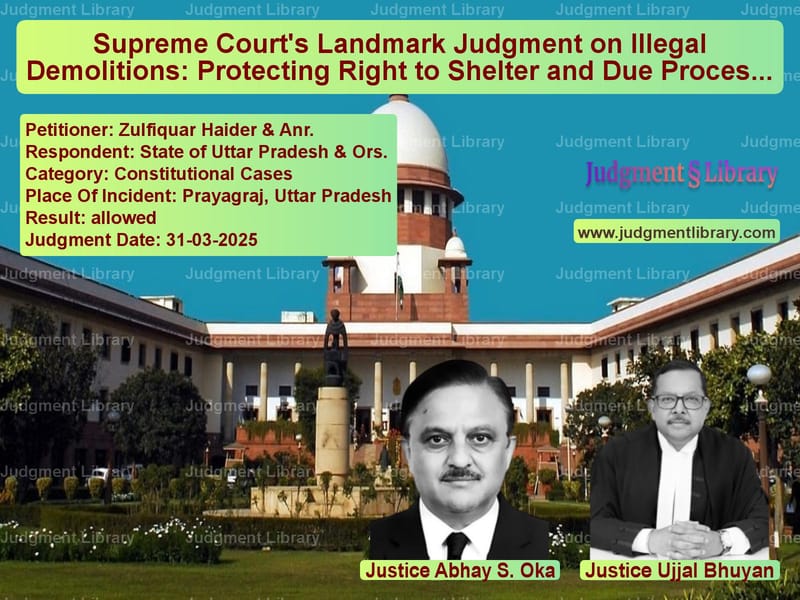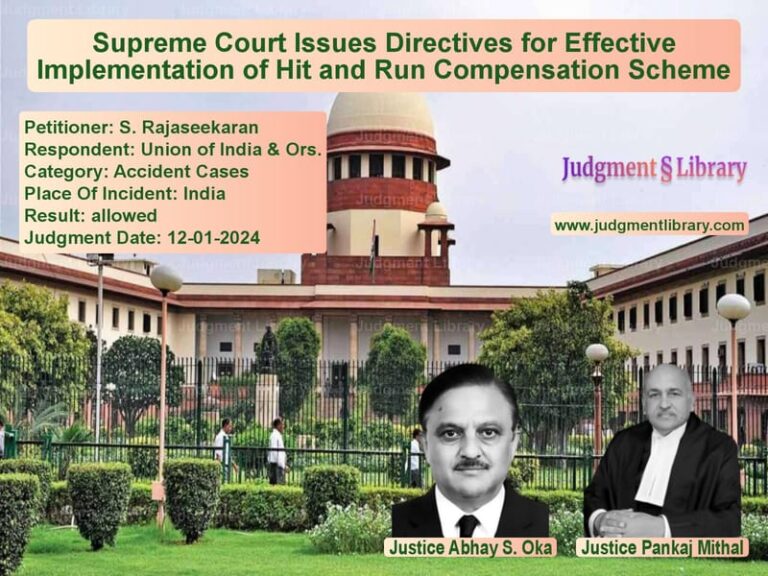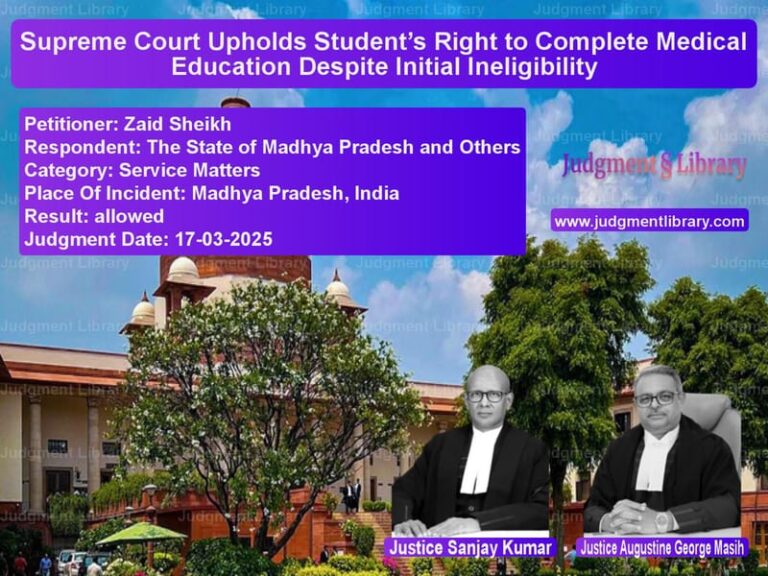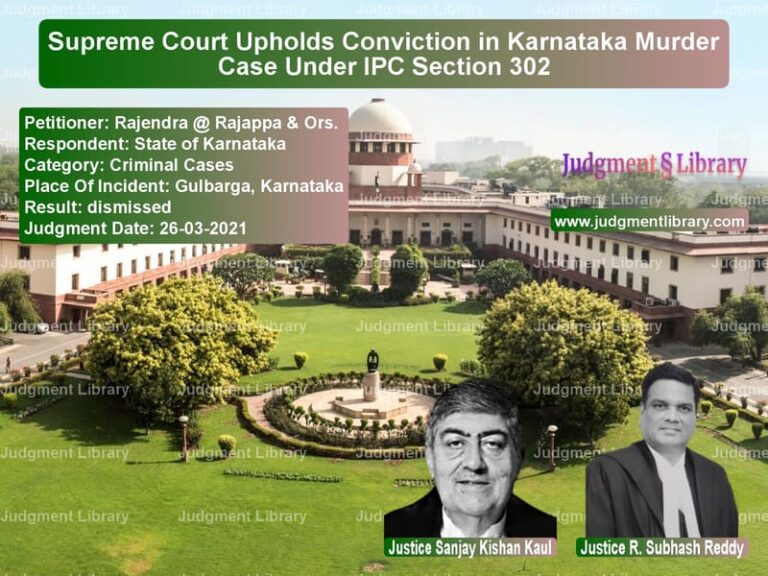Supreme Court’s Landmark Judgment on Illegal Demolitions: Protecting Right to Shelter and Due Process
In a powerful affirmation of constitutional rights, the Supreme Court of India delivered a landmark judgment on April 1, 2025 in the case of Zulfiquar Haider & Anr. vs. State of Uttar Pradesh & Ors. The bench comprising Justices Abhay S. Oka and Ujjal Bhuyan strongly condemned the high-handed demolition of residential structures by the Prayagraj Development Authority (PDA), terming it as ‘shocking the conscience’ and a blatant violation of fundamental rights under Article 21 of the Constitution. This comprehensive judgment, running into detailed analysis of statutory provisions and constitutional principles, serves as a crucial safeguard against arbitrary state action affecting citizens’ right to shelter.
The case originated from the demolition of several residential buildings in Prayagraj (formerly Allahabad) by the PDA in March 2021. The appellants, represented by senior counsel, argued that their homes were demolished without following due process under Section 27 of the Uttar Pradesh Urban Planning and Development Act, 1973. The counsel for appellants vehemently contended: ‘The entire demolition action was carried out in complete violation of principles of natural justice. The show cause notice dated 18th December 2020 was merely pasted on the structures without any genuine attempt at service. The demolition order dated 8th January 2021 was similarly affixed without proper service. When the communication was finally served via registered post on 6th March 2021, our clients’ homes were bulldozed the very next day, leaving no opportunity to appeal.’
The State of Uttar Pradesh and PDA, represented by the Attorney General of India, defended the demolition action by arguing: ‘The structures in question were unauthorized constructions violating the Master Plan. The PDA followed the procedure under Section 27 of the 1973 Act by issuing show cause notices and demolition orders. The provisions allow for affixation of notices when personal service is not possible. The appellants had ample opportunity to regularize their constructions but failed to do so.’
The Supreme Court meticulously examined the facts and legal provisions, delivering a strongly-worded judgment that runs into several crucial observations. Justice Oka, writing for the bench, noted: ‘These cases shock our conscience. The residential premises/buildings of the appellants have been high-handedly and illegally demolished in the manner set out in this judgment.’ The Court particularly emphasized the right to shelter as an integral part of Article 21, stating: ‘The authorities must remember that the right to shelter is also an integral part of Article 21 of the Constitution. This right can be taken away only by following due process of law. Moreover, our country is governed by the rule of law, which is an integral part of the basic structure of the Constitution.’
The judgment contains a detailed analysis of Section 27 of the 1973 Act and Section 43 dealing with service of notices. The Court observed: ‘Clause (d) of sub-Section (1) of Section 43 provides that if a person to whom the document is addressed is not found, it shall be affixed on some conspicuous part of his last known place of residence or business… The words are not “if such a person is not found”. It is clear that only after genuine multiple efforts are made to find the person on more than one day, one can say that “the person cannot be found”.’ This strict interpretation of service requirements forms a crucial part of the judgment’s reasoning.
The Court also relied on its earlier decision in In Re: Directions in the matter of demolition of structures (2024 SCC OnLine SC 3291), quoting paragraph 91A which mandates: ‘No demolition should be carried out without a prior show cause notice returnable either in accordance with the time provided by the local municipal laws or within 15 days’ time from the date of service of such notice, whichever is later… The notice shall be served upon the owner/occupier by a registered post A.D. Additionally, the notice shall also be affixed conspicuously on the outer portion of the structure in question.’
In a scathing observation about the PDA’s conduct, the Court noted: ‘The officers of the PDA must understand that before a structure is demolished, every possible effort should be made to effect a proper service of the show-cause notice. It is their duty to do so.’ The judgment particularly criticized the timing of the demolition, stating: ‘Within 24 hours of the service of the said communication, the structures were brazenly demolished… This deprived the appellants of their opportunity to avail of the remedy of appeal under sub-Section (2) of Section 27 of the 1973 Act.’
The Court’s analysis of the constitutional dimensions forms another significant portion of the judgment. It observed: ‘The residential structures of citizens cannot be demolished in such a summary manner without following the principles of natural justice.’ The term ‘bulldozer justice’ used by the Court has since become significant in constitutional jurisprudence regarding state actions affecting property rights.
After this comprehensive analysis spanning statutory interpretation, procedural requirements and constitutional principles, the Court concluded: ‘Therefore, the demolition action is completely illegal, which violates the appellants’ right to shelter guaranteed by Article 21 of the Constitution of India. The action is completely arbitrary.’ The operative portion of the judgment contains four specific directions:
1) The PDA was directed to scrupulously follow the directions in the Court’s earlier decision regarding demolition procedures;
2) The PDA was ordered to pay costs of Rs.10,00,000/- (Rupees ten lakhs) in each case to the appellants within six weeks, with interest at 6% per annum for delayed payment;
3) The PDA was directed to provide copies of all relevant orders to the appellants; and
4) The appellants were granted liberty to file appropriate proceedings for compensation and to establish their rights over the land.
This judgment represents a significant development in Indian constitutional law, particularly in matters relating to property rights, due process, and state accountability. The detailed reasoning spans the entire spectrum from statutory interpretation to fundamental rights protection, making it a comprehensive precedent for future cases involving similar issues. The Court’s strong language against arbitrary state action and its emphasis on procedural safeguards serve as an important reminder of constitutional values in governance.
Petitioner Name: Zulfiquar Haider & Anr..Respondent Name: State of Uttar Pradesh & Ors..Judgment By: Justice Abhay S. Oka, Justice Ujjal Bhuyan.Place Of Incident: Prayagraj, Uttar Pradesh.Judgment Date: 31-03-2025.Result: allowed.
Don’t miss out on the full details! Download the complete judgment in PDF format below and gain valuable insights instantly!
Download Judgment: zulfiquar-haider-&-a-vs-state-of-uttar-prade-supreme-court-of-india-judgment-dated-31-03-2025.pdf
Directly Download Judgment: Directly download this Judgment
See all petitions in Fundamental Rights
See all petitions in Public Interest Litigation
See all petitions in Property Disputes
See all petitions in Damages and Compensation
See all petitions in Constitution Interpretation
See all petitions in Judgment by Abhay S. Oka
See all petitions in Judgment by Ujjal Bhuyan
See all petitions in allowed
See all petitions in supreme court of India judgments March 2025
See all petitions in 2025 judgments
See all posts in Constitutional Cases Category
See all allowed petitions in Constitutional Cases Category
See all Dismissed petitions in Constitutional Cases Category
See all partially allowed petitions in Constitutional Cases Category







